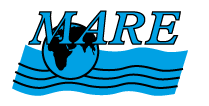A program of the Lawrence Hall of Science that seeks to increase ocean literacy through informal and formal education initiatives
Houses From the Sea
This is an informative story of a brother and sister who spend a day at the beach admiring shells. They find shells in a variety of shapes and colors, and compare each shell to objects that mimic their shape—butterfly wings, castle turrets, spiral staircases, tops, and more. Information is given about the mollusks that live in shells and about how shells are made.
Is This a House for Hermit Crab?
Let's Go Rock Collecting
Kids will immediately be caught by the idea that, "the oldest things you can collect are rocks." This simple geology book goes on to discuss the formation, hardness, types, and uses of rock. The coverage is cursory, yet it is sufficiently engaging to hold the interest of a young audience. Keller's illustrations, line drawings with watercolor washes, work well in showing the cross-sections of earth and volcanoes. Two children appear in many of the scenes, exploring a Roman road, finding fossils, mixing cement, and collecting rocks to store in boxes and egg cartons.
Looking for Crabs
A family goes to the beach to look for crabs. They look everywhere - under big rocks, in little pools, even in shells, but can't seem to find crabs anywhere. Young readers have to look closely to see what the family couldn't.
Marks in the Sand (Windows on Literacy)
Examines tracks made by different animals in the sand.
Miss Rumphius
A young girl tells the story of her aging aunt, Alice Rumphius who had two wishes in life—to travel to faraway places and to live beside the sea. Those wishes have come true, but now Miss Rumphius must fulfill a charge from her grandfather: "You must do something to make the world more beautiful." Miss Rumphius is unsure how to carry out her grandfather’s advice. She does this by sowing lupine seeds throughout her town. This book reminds us that we all have the responsibility to take care of our planet and leave it a better place for future generations.
My Grandpa and the Sea
Grandpa is a careful Caribbean fisherman, using his old dugout canoe and taking only what the sea can give. There comes a day when he can no longer compete with the power boats and their big nets. He casts about trying other work, but is unsatisfied. Knowing that seamoss, a local delicacy, is getting scarce, Grandpa successfully farms it. Although Grandpa does not join the organized religion of the rest of the family, there is a spiritual, conservationist message in his actions.
Nate the Great and the Boring Beach Bag
In this easy-reader mystery, Nate the great detective helps a friend search for his lost beach bag. Through a series of clues and some logical thinking, Nate solves the mystery.
Oil on Water
Read about what happens to marine animals, birds, fish, and beaches when there is an oil spill. Learn how environmental protection groups clean up afterward.
Oil Spill! (Soar to Success)
Beginning with the events and effects of the Exxon Valdez disaster, Berger introduces children to the causes of oil spills, the ecological damage they cause, and the ideas and technologies developed to deal with them. Although the text is simple and clear, it's sometimes choppy: "Chemicals make the oil less harmful. But they add poisons to the water." Does cutting the sentence in two and treating the subordinate clause like a sentence really make it easier to read?
Pages




